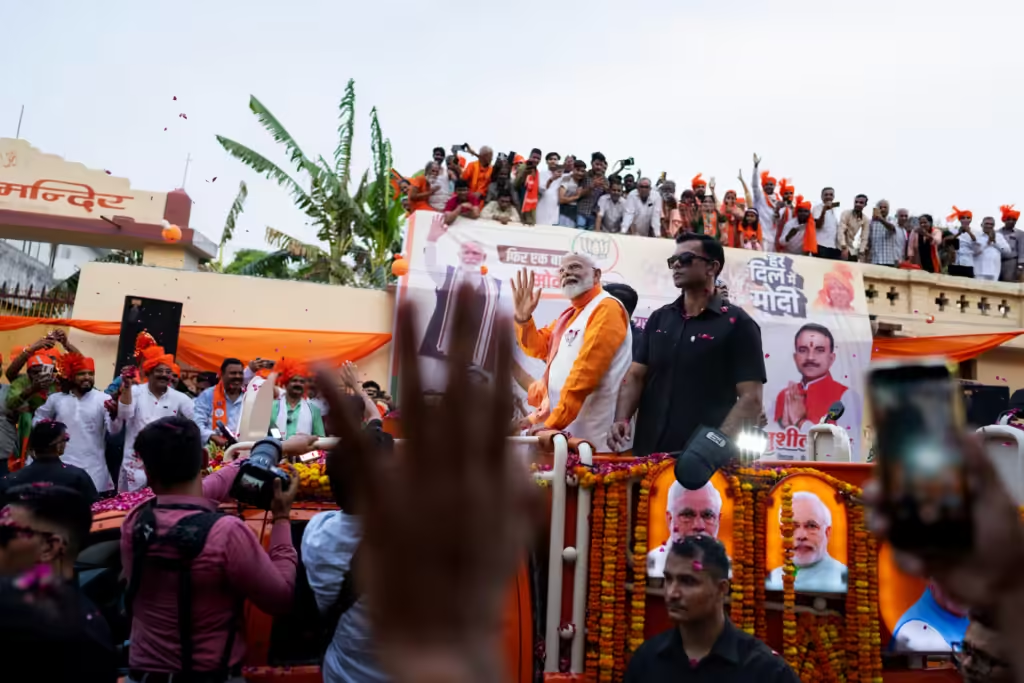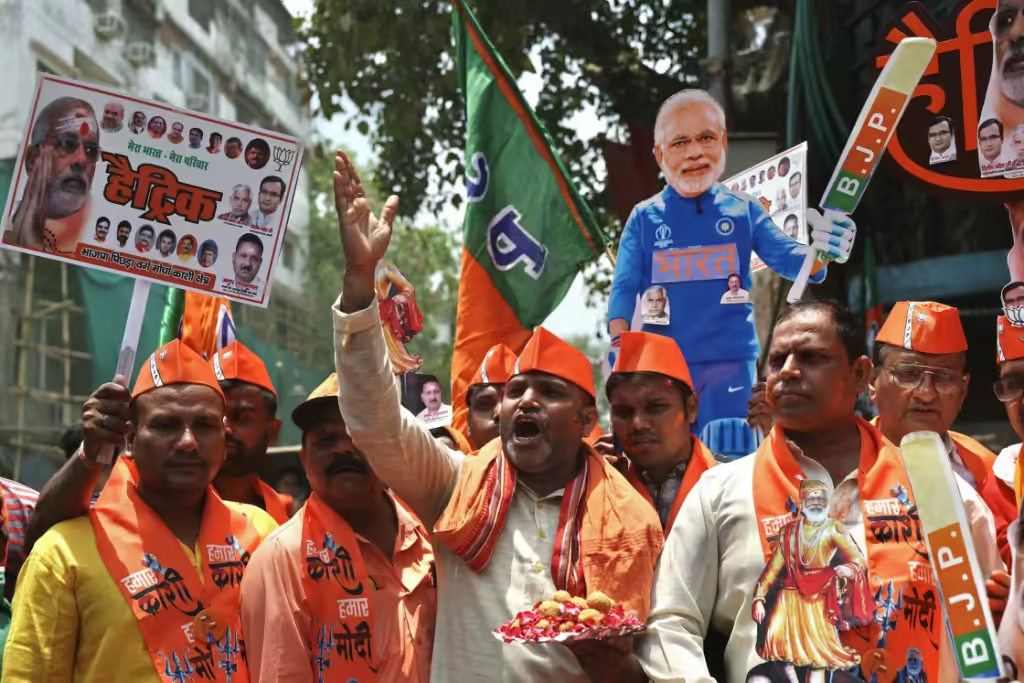Table of Contents
ToggleIntroduction
The results of elections can significantly shape the future of a nation, influencing its political, economic, and social landscape. The recent re-election of Narendra Modi as India’s Prime Minister has garnered global attention, with various implications both domestically and internationally. Let’s dive into the details of this pivotal event and explore its potential impact on India and the world.

Background on Narendra Modi
Early Life and Political Career
Narendra Modi was born on September 17, 1950, in Vadnagar, Gujarat. From humble beginnings, he rose through the ranks of the Rashtriya Swayamsevak Sangh (RSS) and later joined the Bharatiya Janata Party (BJP). His early political career was marked by his role as the Chief Minister of Gujarat, where he served from 2001 to 2014, earning a reputation for promoting economic growth and development.
Rise to Prominence in Indian Politics
Modi’s tenure as Chief Minister paved the way for his rise in national politics. In 2014, he led the BJP to a historic victory in the general elections, becoming the Prime Minister of India. His leadership style, characterized by decisive action and a focus on economic reforms, has been both praised and criticized.
The 2024 Election Campaign
Major Campaign Strategies
Modi’s 2024 re-election campaign was marked by a blend of traditional and modern strategies. The BJP capitalized on social media, mass rallies, and grassroots mobilization to connect with voters. Key slogans and promises, such as “Sabka Saath, Sabka Vikas, Sabka Vishwas” (Together with all, Development for all, Trust of all), resonated with the electorate.
Key Issues Addressed
The campaign addressed several crucial issues, including economic recovery post-pandemic, national security, and social welfare programs. Modi’s promise to continue transforming India into a global powerhouse played a significant role in securing voter support.
Election Results Analysis
Voting Statistics
The 2024 election saw a record voter turnout, with Modi’s BJP securing a clear majority. Detailed analysis of voting patterns revealed strong support from both urban and rural areas, showcasing Modi’s widespread appeal.
Geographic Distribution of Votes
The BJP’s dominance was evident across various states, with significant victories in key regions like Uttar Pradesh, Maharashtra, and Gujarat. This geographic spread highlighted the party’s extensive reach and influence.
Public Reaction to the Election
Domestic Reactions
Within India, reactions to Modi’s re-election were mixed. Supporters celebrated his victory, viewing it as a mandate for continued progress and stability. Critics, however, expressed concerns about issues such as economic inequality and social divisions.
International Reactions
Globally, Modi’s re-election was closely watched. World leaders congratulated him, acknowledging India’s growing importance on the international stage. Analysts speculated on how his continued leadership would influence global geopolitics and economic trends.

Modi’s Vision for India
Economic Policies
Modi’s economic agenda focuses on boosting manufacturing, enhancing infrastructure, and attracting foreign investment. Initiatives like “Make in India” aim to transform the country into a global manufacturing hub.
Social Policies
On the social front, Modi’s government has prioritized healthcare reforms, improving educational standards, and empowering marginalized communities. Programs like Ayushman Bharat, which provides health coverage to millions, illustrate his commitment to social welfare.
Technological Advancements
Modi envisions a technologically advanced India. The Digital India campaign aims to enhance digital infrastructure and increase internet connectivity across the country, fostering innovation and entrepreneurship.
Economic Impact
Domestic Economy
Modi’s re-election is expected to bring stability to India’s economy. His policies are geared towards achieving higher growth rates, reducing unemployment, and improving the ease of doing business.
Global Trade Relations
Under Modi’s leadership, India seeks to strengthen its trade relations with major economies, including the United States, China, and the European Union. Trade agreements and collaborations are likely to be key focal points.
Social Changes and Policies
Healthcare Reforms
Modi’s healthcare initiatives aim to make quality healthcare accessible to all. The Ayushman Bharat scheme, often dubbed as the world’s largest healthcare program, is a testament to these efforts.
Education Policies
Education is another priority, with policies aimed at enhancing the quality of education and making it accessible to all segments of society. The New Education Policy (NEP) 2020 lays the foundation for significant reforms in the education sector.
Women Empowerment Initiatives
Modi’s government has launched various programs to empower women, including initiatives to improve female literacy rates, provide better healthcare, and ensure greater participation in the workforce.
Technological Advancements
Digital India Campaign
The Digital India campaign aims to transform India into a digitally empowered society. Efforts include expanding broadband connectivity, promoting digital literacy, and encouraging digital payments.
Innovations in IT Sector
India’s IT sector has seen remarkable growth under Modi’s leadership. Policies fostering innovation, start-ups, and technological research have positioned India as a global leader in IT services.
Foreign Policy and Diplomacy
Relations with Neighboring Countries
Modi’s foreign policy emphasizes maintaining peaceful and cooperative relations with neighboring countries. Efforts to resolve border disputes and enhance economic ties with nations like Nepal, Bhutan, and Bangladesh are ongoing.
Global Partnerships
India’s global partnerships have strengthened, with strategic alliances formed with countries such as the USA, Japan, and Australia. These partnerships focus on defense, technology, and trade.
Challenges Ahead
Economic Challenges
Despite significant progress, India faces economic challenges such as reducing poverty, managing inflation, and addressing unemployment. Modi’s government must navigate these issues to sustain growth.
Social Challenges
Social challenges include addressing caste-based disparities, ensuring social justice, and promoting communal harmony. Policies must focus on inclusivity and equality.
Environmental Challenges
Environmental sustainability is a growing concern. Modi’s government needs to tackle issues like pollution, climate change, and resource management through effective policies and initiatives.
Modi’s Leadership Style
Characteristics of His Leadership
Modi’s leadership is marked by a strong vision, decisive action, and effective communication. His ability to connect with the masses and deliver on promises has bolstered his popularity.
Comparison with Previous Leaders
Compared to previous Indian leaders, Modi is seen as a transformative figure, with a focus on modernizing the nation and enhancing its global stature. His approach is often contrasted with more traditional leadership styles.
The Role of BJP in Modi’s Success
Party Strategies
The BJP’s organizational strength and strategic planning have been crucial to Modi’s success. The party’s ability to mobilize support and effectively communicate its agenda played a significant role in the election victory.
Key Members and Their Contributions
Key BJP members, including Amit Shah and other senior leaders, have been instrumental in shaping the party’s strategies and ensuring cohesive execution of the campaign.
Future Prospects
Predictions for Modi’s Term
Modi’s current term is expected to focus on continuing economic reforms, enhancing social welfare, and strengthening India’s global position. Analysts predict further advancements in technology and infrastructure.
Potential Impact on Future Elections
Modi’s re-election sets the stage for future political dynamics in India. His policies and performance will likely influence the outcomes of subsequent elections, shaping the country’s political landscape.
Conclusion
Narendra Modi’s re-election as Prime Minister of India marks a significant moment in the nation’s history. With a strong mandate, he aims to drive economic growth, social progress, and technological advancements. However, numerous challenges lie ahead, requiring effective governance and inclusive policies. As India navigates this new chapter, the world watches closely, anticipating the broader implications of Modi’s leadership on global geopolitics and economic trends.
FAQs
What were the key factors in Modi’s re-election?
Modi’s re-election was driven by his economic policies, social welfare programs, and effective campaign strategies that resonated with a broad spectrum of voters.
How has Modi’s re-election impacted India’s economy?
Modi’s re-election is expected to bring stability and continuity to India’s economic policies, focusing on growth, infrastructure development, and foreign investment.
What are the major challenges Modi faces in his new term?
Major challenges include addressing economic disparities, promoting social inclusivity, and managing environmental sustainability.
How does Modi’s leadership compare to other global leaders?
Modi’s leadership is often compared to transformative global leaders due to his decisive action, vision for modernization, and ability to connect with the masses.
What can we expect from Modi’s government in the next five years?
In the next five years, expect continued focus on economic reforms, social welfare programs, technological advancements, and strengthening India’s global position.